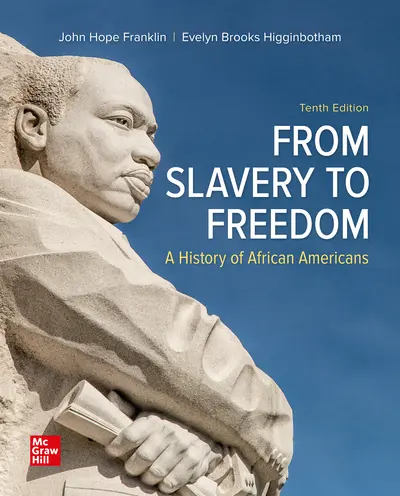My Account Details

ISBN10: 0073513342 | ISBN13: 9780073513348

* The estimated amount of time this product will be on the market is based on a number of factors, including faculty input to instructional design and the prior revision cycle and updates to academic research-which typically results in a revision cycle ranging from every two to four years for this product. Pricing subject to change at any time.
Instructor Information
Quick Actions (Only for Validated Instructor Accounts):
Since its first edition in 1947, From Slavery to Freedom: A History of African Americans has inserted the black experience squarely into American history—a narrative that previously denied black contribution or at best dismissed its importance. An ever-growing mountain of scholarship on African Americans informs the book’s discussion of several topics, from the development of metallurgy in ancient African civilizations to the story of black life in the British colonies to the emergence of social movements and activism in communities across the United States in the mid-twentieth century. This edition of From Slavery to Freedom also incorporates new historical actors, including the role of women throughout history, particularly in slavery, abolitionism, the Jim Crow era, and the civil rights/black power movement.
CHAPTER 1: Ancestral Africa (circa 500 B.C.E to 1600)
CHAPTER 2: Africans in the Atlantic World (1492–1800)
CHAPTER 3: Establishing North American Slavery (1520s to 1720s)
CHAPTER 4: Eighteenth-Century Slave Societies (1700–1780s)
CHAPTER 5: Give Me Liberty (1763–1787)
CHAPTER 6: Building Communities in the Early Republic (1790–1830)
CHAPTER 7: Southern Slavery (1790–1860)
CHAPTER 8: Antebellum Free Blacks (1830–1860)
CHAPTER 9: Abolitionism in Black and White (1820–1860)
CHAPTER 10: Civil War (1861–1865)
CHAPTER 11: Promises and Pitfalls of Reconstruction (1863–1877)
CHAPTER 12: The Color Line (1877–1917)
CHAPTER 13: The Era of Self-Help (1880–1916)
CHAPTER 14: In Pursuit of Democracy (1914–1919)
CHAPTER 15: Voices of Protest (1910–1928)
CHAPTER 16: The Arts at Home and Abroad (1920s to early 1930s)
CHAPTER 17: The New Deal Era (1929–1941)
CHAPTER 18: Double V for Victory (1941–1945)
CHAPTER 19: American Dilemmas (1940–1955)
CHAPTER 20: We Shall Overcome (1947–1967)
CHAPTER 21: Black Power (1955–1980)
CHAPTER 22: Progress and Poverty (1980–2000)
CHAPTER 23: Shifting Terrains in the New Century
Accessibility
Creating accessible products is a priority for McGraw Hill. We make accessibility and adhering to WCAG AA guidelines a part of our day-to-day development efforts and product roadmaps.
For more information, visit our accessibility page, or contact us at accessibility@mheducation.com
Affordability
Reduce course material costs for your students while still providing full access to everything they need to be successful. It isn't too good to be true - it's Inclusive Access.
Need support? We're here to help - Get real-world support and resources every step of the way.